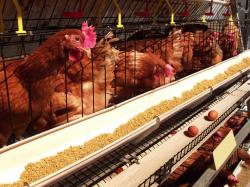The Fight For Cage-Free Eggs
April 25, 2016 | 1 min to read

What should the regulations for animal confinement be?
Voters in Massachusetts are poised to decide in a November ballot question whether the state should ban the sale of whole eggs, pork products, or veal from animals that can’t turn around or stretch their limbs within their cages. The prohibition would apply to producers both in and outside the commonwealth, with one of the biggest changes being that eggs sold in the state be “cage-free” when the law goes into effect in 2022, if voters agree to the proposal.
Proponents of the ballot initiative contend giving animals more living space improves their well being, ultimately leading to a higher-quality product and increased productivity. Consumers also stand to benefit, they argue, from a reduction in foodborne illness, as disease is less likely to spread as quickly in barns with more spacious quarters. Food producers, on the other hand, say doing so results in higher prices for consumers. They maintain battery cages and gestation stalls for breeding pigs—which the National Pork Producers Council said are used by more than 80 percent of producers nationwide—make it easier to ration feed, prevent animals from hurting one another, and administer medicine and other care.
Source: To read the rest of the story, please go to: The Atlantic
